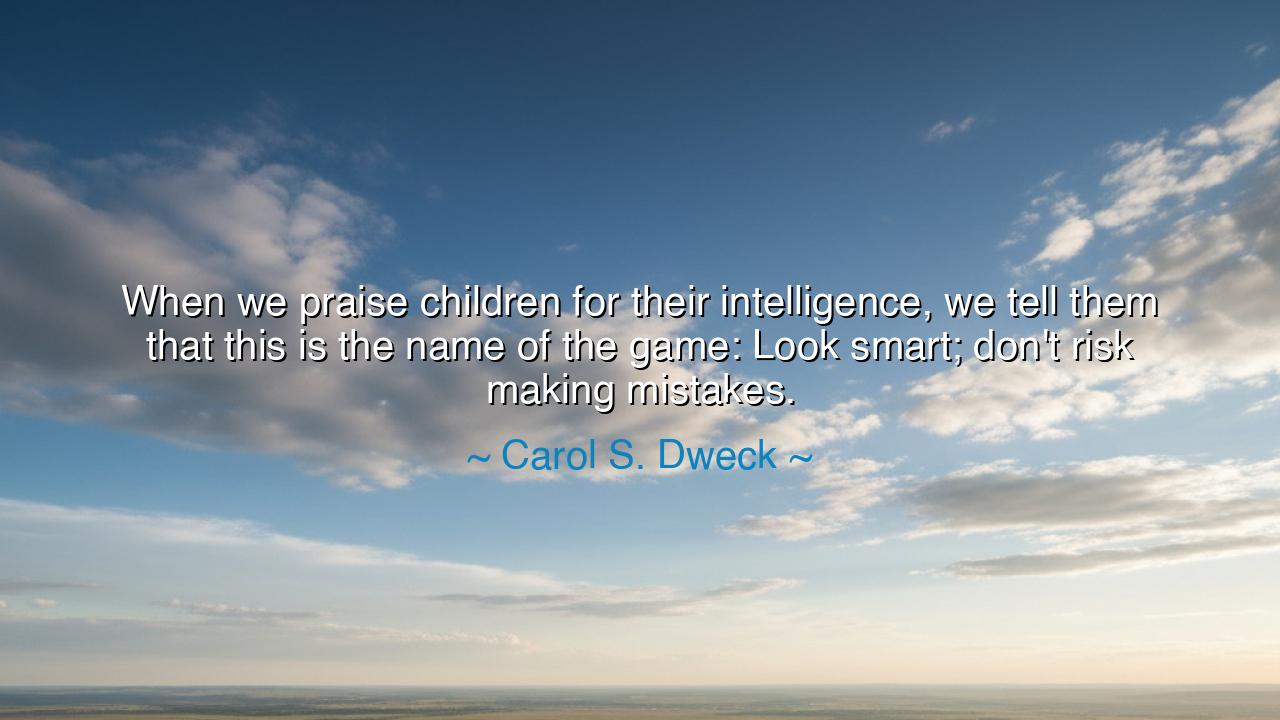
When we praise children for their intelligence, we tell them that
When we praise children for their intelligence, we tell them that this is the name of the game: Look smart; don't risk making mistakes.






The words of Carol S. Dweck, scholar of the human spirit and mind, strike with the quiet thunder of truth: “When we praise children for their intelligence, we tell them that this is the name of the game: Look smart; don’t risk making mistakes.” In these words lies not condemnation, but revelation — a call to awaken from the illusion that intelligence is the crown of worth, rather than the seed of growth. Dweck reminds us that by exalting cleverness over courage, we raise generations who fear failure more than they seek wisdom. It is a subtle but perilous deception — for when the soul is trained to avoid mistakes, it also learns to avoid mastery.
The origin of this teaching springs from Dweck’s lifelong study of what she called the “mindset.” In her research, she found that people generally live within two realms of belief: the fixed mindset, which sees intelligence and ability as gifts carved in stone, and the growth mindset, which knows that every mind can expand through effort, curiosity, and resilience. To praise a child merely for being “smart,” she discovered, is to trap them in the prison of perfection — where every risk threatens identity and every failure feels like proof of inadequacy. Thus, the child learns not to explore, but to perform. They learn not to learn, but to look as though they already know.
In truth, this wisdom is as old as civilization itself. The ancient philosophers taught that knowledge is born not from certainty, but from wonder. Socrates, greatest of all Greek thinkers, claimed to know nothing — and in this humility, he unlocked the highest form of intelligence. His strength was not in appearing wise, but in seeking truth beyond his errors. Those who worship the image of intelligence — the smooth, unblemished mask of knowing — never experience the joy of discovery. For every discovery requires first the courage to be wrong, the willingness to stumble through darkness until the light appears. To teach children to fear mistakes is to dim this sacred light before it can ever shine.
History offers its echoes of this truth. Consider Thomas Edison, the inventor who brought light to the world. When asked about his countless failed experiments before creating the electric bulb, he replied, “I have not failed. I’ve just found 10,000 ways that won’t work.” This was not the speech of a man obsessed with appearing intelligent, but of one who understood that failure is the teacher of invention. Had Edison been raised to guard his image of genius, to avoid all risk of being wrong, the world might still be waiting for light. So it is with all great minds — their brilliance is born not of praise, but of persistence.
Dweck’s words carry a moral warning for parents, teachers, and all who guide the young. To praise effort is to plant in a child the belief that they can shape their destiny; to praise intelligence alone is to bind them to the fragile shell of what they already are. The child who believes in their ability to grow will face challenges with open arms, for each difficulty becomes a chance to rise higher. But the one who believes their worth lies in their apparent cleverness will shrink from every challenge, fearing exposure, shame, or defeat. In the garden of the mind, one grows toward the sun, and the other hides beneath the soil — and both become what they believe.
The lesson, therefore, is clear and enduring: nurture growth, not vanity. Celebrate effort, not image. Teach children — and yourself — that wisdom is not the absence of error, but the mastery of it. To make a mistake is not to fall from grace; it is to take the first step toward truth. When we cease fearing failure, we begin to touch the boundless nature of the human spirit — the power that learns, adapts, and creates without limit. This is the soil in which genius truly blossoms.
So, O keeper of young minds and of your own, take Dweck’s wisdom as a sacred instruction. When you see a child succeed, do not say, “You are so smart.” Say instead, “You worked hard,” or “You didn’t give up,” or “You learned something new.” In doing so, you remind them that the mind is a living flame — one that grows brighter with every test. Let no one, least of all yourself, live in fear of being wrong. For the one who dares to err also dares to ascend. And in this daring lies the truest form of intelligence — not the brittle pride of appearing perfect, but the eternal courage to keep becoming.






AAdministratorAdministrator
Welcome, honored guests. Please leave a comment, we will respond soon